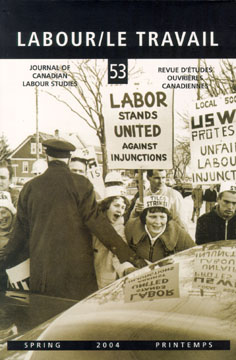Abstract
In 1967 a strike of marginalized women workers in small-town Ontario became a cause célèbre for the Ontario and national labour movements due to the employers’ use of an ex parte injunction to break the strike, and the trade union movement’s subsequent legal challenge to that injunction. This article explores the initial Tilco strike in Peterborough, the ensuing attempts by the labour movement to support the striking local of the Textile Workers Union of America (TWUA), the criminal trials of those arrested for disobeying the injunction, and the Ontario Royal Commission on Labour Disputes which followed, chaired by Justice Ivan Rand. These events serve as a useful window through which to view labour-capital relations in this period, particularly the way in which the “Fordist” accord was profoundly gendered. Tilco also reveals a labour movement strengthened by post-World War II industrial legality, but challenged from its own margins by dissatisfaction of the rank and file with that same industrial legality. Finally, Tilco and the ensuing battle over injunctions highlights interpretive debates in Canadian working-class history concerning the state, the legal regulation of labour, and the potential malleability of state institutions in the face of pressures for reform.
Résumé
En 1967, une grève de travailleuses marginales dans une petite ville de l’Ontario était devenue une cause célèbre pour les mouvements ouvriers ontariens et canadiens en raison de l’injonction demandée ex parte par l’employeur pour briser la grève, ainsi que pour la contestation judiciaire subséquente du mouvement syndical à l’égard de cette injonction. Cet article permet d’analyser la grève initiale á la Tilco à Peterborough, les essais consécutifs du mouvement ouvrier pour appuyer la section locale du Syndicat des travailleurs amalgamés du vêtement et du textile, les procès criminels des personnes arrêtées pour la désobéissance à l’injonction, ainsi que la Commission royale sur les conflits industriels qui a suivit, de l’Ontario, présidée par le juge Ivan Rand. Ces événements servent de fenêtres par lesquelles on peut clairement voir les relations entre la main-d’œuvre et le capital dans cette période, en particulier, la façon dont l’accord « fordiste » était profondément sexiste. La grève à la Tilco révèle aussi un mouvement syndical renforcé par la légalité industrielle après la Seconde Guerre mondiale, mais contesté à sa périphérie en raison de l’insatisfaction de la base syndicale avec cette légalité industrielle. Finalement, la grève à la Tilco et la bataille subséquente provoquèe par les injonctions soulignent les débats interprétatifs dans l’histoire canadienne de la classe ouvrière concernant le rôle de l’État, le cadre juridique des relations ouvrières et la malléabilité des institutions de l’État face à des pressions pour des réformes.
